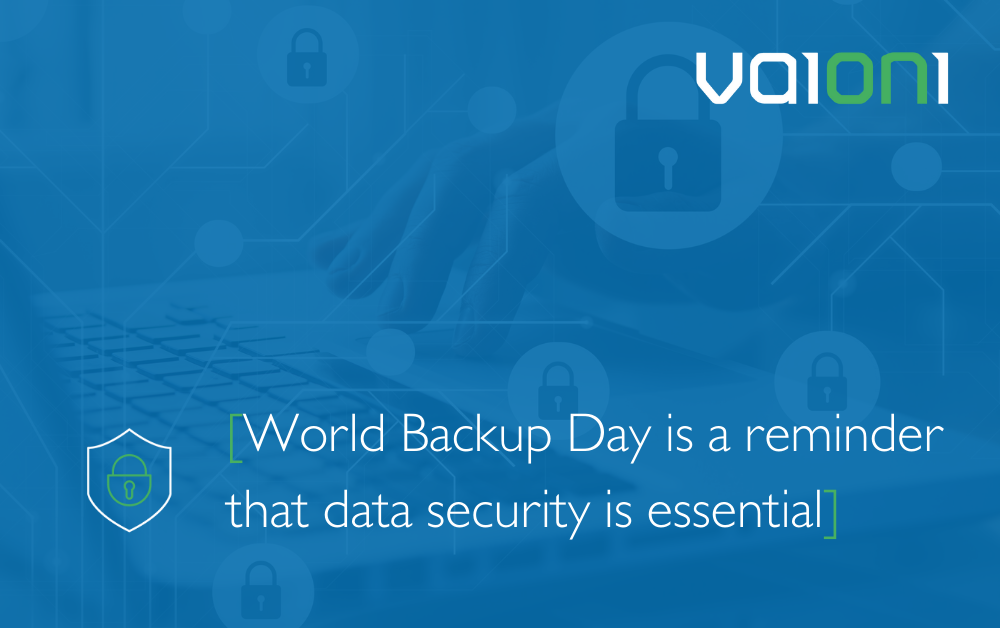World Backup Day is a reminder that data security is crucial
Today is World Backup Day, “a day for people to learn about the increasing role of data in our lives and the importance of regular backups.”
It’s mainly aimed at consumers, who often have a wealth of important data squirrelled away on a variety of devices – from smartphones to laptops – and never think to back it up. In fact, 21% of us have never made a backup.
Losing that data could be damaging in all sorts of ways. It might include a video of your baby’s first unsteady steps, or an important email from your bank.
But of course, if losing data would be upsetting for consumers, it could be calamitous for businesses. Regardless of size, businesses rely on a range of business-critical data, from customer information and orders to payment details and accounts.
For businesses, backing up data can mean the difference between failure and survival if the worst happens. Here’s what you need to know about keeping your data safe.
What could happen to data?
So what could happen to your data? Unfortunately, the list is a long one.
- Theft and loss. According to World Backup Day, 113 phones are lost or stolen every minute.
- Statistics suggest that break-ins at small businesses are common. One study found that nearly 10% are affected every year.
- 29% of data loss incidents are caused by accidents.
- Fire and flood. Acts of God that affect businesses are becoming more common as the planet gets warmer and wetter.
- Cybercriminals target your data. Ransomware attacks – that lock you out of your systems and files until you pay a ransom – are on the rise, and by some accounts the majority are aimed at small and midsize businesses. Overall, more than a third (39%) of UK businesses reported a data breach or a cyber attack in 2020/2021.
What can you do to protect your data?
To protect their data, all businesses should implement a thorough cybersecurity strategy and adopt the tools that keep cybercriminals at bay.
After that, the most important thing you can do is regularly backup your data. What does that involve? The Government’s National Cyber Security Centre suggests a four point plan:
Identify the data you can’t do without. The details may be different for every business, but it is likely to include documents, emails, invoices, receipts, calendar details, contact lists and so on. Or to put it another way, if losing it would affect your ability to do business, add it to the backup list.
- Separate essential data from your computer or network. If you’re a very small business and all your information is stored on a few computers, you may only need to backup data onto an external hard drive or USB stick. The important thing is to disconnect it from the device that holds the original information, and store it separately from your computers, ideally at a different location. If you have more devices, disconnect your backup from your local network except during the backup process.
- Consider the cloud – we’ll come back to this below.
- Backup regularly. And ideally everyday. That might sound time-consuming but can be automated with good backup solutions.
Use the cloud
Probably the best thing businesses of all sizes can do is invest in a cloud storage solution. You probably store a lot of information in the cloud already. Unless you run a dedicated email server, your emails will be stored in the cloud. If you use an application like Office 365, your documents will be too.
The beauty of cloud storage is that it stores your business-critical data in an entirely separate physical location. Important information will be on local computers or servers in your office, and mirrored in a cloud data centre which could be at the other side of the country or even abroad.
If you use a reputable provider, your data will be protected by enterprise-grade physical security and digital firewalls.
You can backup manually to the cloud, but good Backup as a Service (BaaS) solutions can take the hassle out of your hands. They run continuously, making up-to-the-second copies of all your important data, systems and applications automatically.
Should disaster strike, you can spin up new copies of your software applications, with all associated data, in seconds. In that way, cloud storage covers you against accidents, acts of God and malicious intent.
Cloud storage is the most thorough and efficient way to backup your data, and should be part of every organisation’s digital transition plans. But whether you choose a cloud solution or not, backup is essential. For businesses, World Backup Day should be a reminder that everyday is a day for data security.


